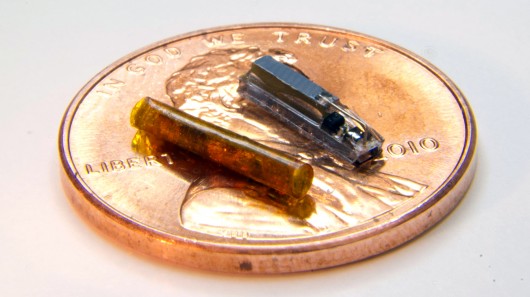
Some cancers, such as pancreatic and cervical cancers, are notoriously hypoxic, which means they contain low oxygen levels. Because radiation therapy needs oxygen to be effective, hypoxic areas of a tumor can be difficult to kill. To combat this, researchers at Purdue University have developed and tested a miniature electronic device that is designed to be implanted into solid tumors to generate oxygen and boost the effectiveness of radiation and chemotherapy treatments.
Once implanted into a tumor, the new “implantable micro oxygen generator” uses ultrasonic signals to generate a small voltage to separate oxygen and hydrogen from water in a chemical process called water electrolysis. The devides are just under one centimeter (0.39-in) long and are inserted into tumors with a hypodermic biopsy needle.
“We are putting these devices inside tumors and then exposing the tumors to ultrasound,” said Babak Ziaie, a Purdue University professor of electrical and computer engineering and biomedical engineering. “The ultrasound energy powers the device, generating oxygen.
The devices, which were created at the Birck Nanotechnology Center in Purdue’s Discovery Park, have been tested in pancreatic tumors implanted in mice. The tests showed the devices generated oxygen, which resulted in the tumors shrinking faster than tumors without the devices.
The Purdue researchers have filed a patent for the current design and are looking at the possibility of redesigning it to make it more practical for manufacturing and clinical trials.
The results of the team’s research appear in a paper published online inTransactions on Biomedical Engineering.
About the Author
 Darren’s love of technology started in primary school with a Nintendo Game & Watch Donkey Kong (still functioning) and a Commodore VIC 20 computer (not still functioning). In high school he upgraded to a 286 PC, and he’s been following Moore’s law ever since. This love of technology continued through a number of university courses and crappy jobs until 2008, when his interests found a home at Gizmag. All articles by Darren Quick
Darren’s love of technology started in primary school with a Nintendo Game & Watch Donkey Kong (still functioning) and a Commodore VIC 20 computer (not still functioning). In high school he upgraded to a 286 PC, and he’s been following Moore’s law ever since. This love of technology continued through a number of university courses and crappy jobs until 2008, when his interests found a home at Gizmag. All articles by Darren Quick




